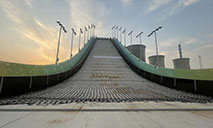U.S. should pivot away from "China threat" obsession

Photo taken on Oct. 28, 2021 shows the White House in Washington, D.C., the United States. (Xinhua/Liu Jie)
China and the United States are the world's top two economies. They are not destined to be rivals as some narrow-minded China hawks in Washington predict. And few around the world would disagree that the two sides stand to gain from cooperation and lose from confrontation. This is even truer when the global community has to face a torrent of pressing planetary challenges, like climate change and terrorism.
BEIJING, Nov. 3 (Xinhua) -- Three decades after the end of the Cold War, some in Washington are still latching onto looking at the world through a zero-sum lens and creating "imaginary enemies."
Washington's proclivity towards global hegemony is at the root of this anachronistic yet still dangerous mentality. Such an unchecked intransigence threatens to destabilize the post-war world order that has largely guaranteed global peace and stability for the past seven decades and more.
In recent years, those die-hard zero-summers in Washington have been gearing up their efforts to paint China as the world's new "bogeyman," peddling the so-called "China threat" theory whenever and wherever possible.
Earlier last month, despite China's repeated clarification that it only tested a reusable orbital spacecraft which has no military implications, some senior generals in Washington were quick to go back to their Cold War memories and rehashed the term "Sputnik moment," a jargon born at the peak of the era when the United States and the Soviet Union were at loggerheads over global supremacy.
Such a groundless claim that China has tested a hypersonic missile and the ensuing clamor about the "Sputnik moment" have once again reflected Washington's deeply ingrained Cold War paranoia, as well as its obsession with the dream to dominate the world against the trend of multilateralism and multipolarity.

Tourists spend time on the National Mall in Washington D.C., the United States on Oct. 30, 2021. (Photo by Ting Shen/Xinhua)
It is certainly not the first time for Washington to resurrect the Cold War metaphor. Over the past years, whenever China had made some breakthroughs in areas which Washington considers "threatening," like the 5G technologies and those related to space exploration in particular, a great uproar was raised that China was catching up fast, and a new "Sputnik moment" was arriving.
For those with the obsolete thinking and entrenched ideological bigotry, China's impressive development and achievements are always viewed through the same prism of a you-win-I-lose geopolitical game, exactly the way in which the United States once reacted to the Soviet Union's achievements in the Cold War years.
In fact, one of the key reasons why the United States feels overly anxious from time to time towards what ought to be normal progress of other countries is highly psychological.
Even before America's independence, those Anglo-Saxon immigrants who fled to this ex-British colony started to hypnotize themselves with the myth that they were God's "chosen people." As Dr. Henry Kissinger noted in his book "World Order," Americans believe that their country is destined to "shape the destiny of mankind." In their logic, this "shining city upon a hill" should always lead, and has no reason to follow.
That is why the mood of the country was so mixed up when the Soviet Union successfully put its Sputnik satellite into the Earth's orbit in 1957: for Americans of all walks of life then, it was so much shock, so much frustration and self-doubt, so much fear and anger. "Americans were learning humility-and humiliation. They had become an international laughingstock," William Manchester chronicled in his book "The Glory and the Dream."
As the United States is stuck in increasingly toxic and polarized partisan politics, the "China-threat" hyperbole has been employed by politicians of both Democrats and Republicans as a convenient political tool to push forward their domestic plans and foreign policy agendas.

Photo taken on Oct. 28, 2021 shows the U.S. Commerce Department in Washington, D.C., the United States. (Xinhua/Liu Jie)
In other words, when those in Washington attempt to build up domestic infrastructures, they will invoke China; when they want to spike military spending, they use China to scare the public; and when they try to strengthen their hold on other parts of the world, they will almost certainly sound the "China alarm" as loudly as they can.
However, Washington's hegemonic anxiety and attempts to portray China as its next "arch enemy" has imperiled world peace and stability.
By resorting to overly militarized approach to Asia as means to contain China's development, Washington is heightening tensions and increasing the risk of conflict, as recently commented by the Foreign Affairs (FA).
"Washington's over-militarized approach not only increases the risks of war and arms racing but also reduces the prospects for stability and prosperity in Asia," warned the FA opinion, titled "America is turning Asia into a powder keg."
Though the United States spent more on defense than the next 11 following countries combined in 2020, according to data by the Stockholm International Peace Research Institute, Washington cannot stop claiming that its national security is threatened.
The past few years have witnessed how the United States is becoming the biggest driver of militarization of the South China Sea and the most dangerous factor damaging peace in the region.
For a long time, under the pretext of "freedom of navigation," Washington has repeatedly sent military vessels and aircraft to the South China Sea and staged war games in regional waters to flex its muscles. Under the pretense of multilateralism, it has also been trying to resurrect a small circle of countries called "Quad" in the Asia Pacific since 2017 to counter China.
However, such moves have done nothing other than undermining the freedom of navigation in the South China Sea and threatening the sovereignty and security of China and other regional countries.
More alarmingly, Washington has kept playing the Taiwan card to disrupt China's drive for national reunification and development. Its blatant acts, including repeatedly selling arms to Taiwan, sending U.S. warships through the Taiwan Strait and tiptoeing on growing official ties with the Chinese island province have undermined the China-U.S. ties' political foundation, and greatly harmed peace and stability across the Taiwan Strait.

White flags honoring the lives lost to COVID-19 are seen on the National Mall in Washington, D.C., the United States, on Oct. 2, 2021. (Xinhua/Liu Jie)
China and the United States are the world's top two economies. They are not destined to be rivals as some narrow-minded China hawks in Washington predict. And few around the world would disagree that the two sides stand to gain from cooperation and lose from confrontation. This is even truer when the global community has to face a torrent of pressing planetary challenges, like climate change and terrorism.
The current U.S. administration recently vowed that it does not intend to have a new Cold War with China. It should honor its pledge with concrete actions, not inflammatory provocations.
To do that, Washington should treat Beijing as an equal and with due respect, especially on matters concerning China's core interests. But more fundamentally, those Cold War hawks back in Washington should try to wean themselves off the addiction to outdated political philosophy, open their hearts and minds and embrace openness, true multilateralism as well as other tenets this ever-interconnected world features.
America's "unipolar moment" in the wake of the Cold War has been rare in human history and is gone. Those years of Washington's sole global supremacy should not be taken as a normality for the future either.
Instead of being either beguiled by the unwarranted "American exceptionalism" or misguided by the baseless "China threat" obsession, Washington should pivot to equal partnership and peaceful coexistence with China and others. That is how the United States can act as a responsible superpower in the future world.
Photos
Related Stories
- China tells U.S. to stop suppressing Chinese students
- China again demands clarification of U.S. Navy nuclear-sub incident
- U.S. democracy problems can only be solved by American people themselves: Chinese FM spokesperson
- Most U.S. congressional districts see growth in goods exports to China in 2020: USCBC
- Study says U.S. "China Initiative" stymies scientific innovation: SCMP
Copyright © 2021 People's Daily Online. All Rights Reserved.










